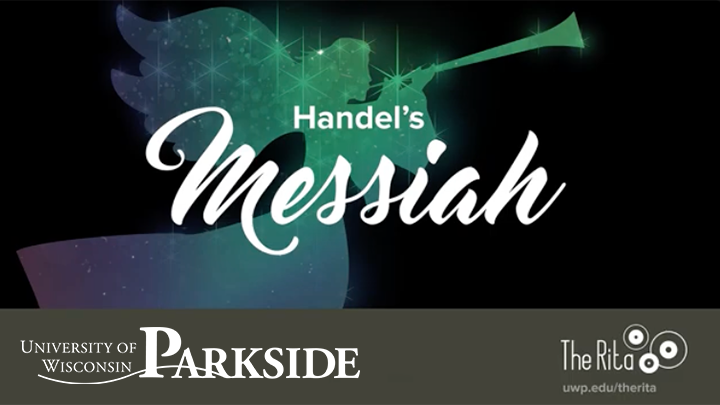Holiday Favorite Messiah Returns to UW-Parkside
Dedicated to the memory of UW-Parkside Professor Emerita Frances Bedford
Kenosha, Wis.- A cherished Southeast Wisconsin tradition continues when the UW-Parkside Master Singers and Voices of Parkside, along with orchestra and professional soloists, sing George Frideric Handel’s complete Messiah, one of the great treasures of Western music. The performance, under the direction of UW-Parkside Professor of Music and Director of Choral Activities, James Kinchen, will take place in the beautiful, acoustically superb Bedford Concert Hall in the Rita Tallent Picken Regional Center for Arts and Humanities.
Performances are Saturday, Dec. 7 at 7 p.m. and Sunday, Dec. 8 at 3 p.m. in Bedford Hall in the Rita on campus. Tickets are $10 for adults and $5 for students and senior citizens. For tickets or more information go to https://www.uwp.edu/therita/
The choir for the UW-Parkside performances will consist of the university’s campus-community chorus, Master Singers, and the chamber group, Voices of Parkside. This year’s soloists are Shaleece Peters, soprano; Emily Bergeron, alto; Aaron Short, tenor; and David Guzmán-Estrada, bass. The singers will be accompanied by an orchestra of university alumni, faculty, and professional community musicians, specially assembled for the occasion.
This year’s series will be dedicated to the memory of UW-Parkside Professor Emerita Frances Bedford. Bedford, a published music scholar faculty member at the university for almost a quarter of a century, played harpsichord for each of the 30-plus UW-Parkside performances of Messiah, since the inception of the series in 1993, presiding at the harpsichord the last time in December of 2021. Bedford passed away in 2023 at the age of 98. Bedford was the generous benefactor to the music department for whom Bedford Hall was named.
Since 1993, the university has presented Messiah every three years in more than 30 performances. Most people have heard the rousing Hallelujah Chorus, the most familiar excerpt from the oratorio. But the entire work, which includes choral numbers, solos, and instrumental movements, tells of the prophecy, birth, ministry, death, resurrection, and ultimate triumph of the Messiah, mostly through the texts of Bible prophets that have been set by Handel to critically acclaimed music.
Handel, one of music’s most acclaimed composers, wrote Messiah in the span of about three weeks in the late summer of 1741. It was premiered the following spring in Dublin, Ireland. Performances of it soon became a welcomed tradition in London, where Handel lived. He led performances of the oratorio from his seat at the harpsichord until a week before his death in 1759.
In the decades that followed, performing Messiah became a treasured tradition in much of the Western world. In Handel’s time, Messiah was performed in the spring, during the time of Lent. As this great work gained fame, and as more performers and audiences experienced this powerful and moving music, Messiah became increasingly more associated with the season of Christmas.
The University of Wisconsin-Parkside is committed to high-quality educational programs, creative and scholarly activities, and services responsive to its diverse student population, and its local, national, and global communities. We are a dynamic learning community grounded in academic excellence and focused on student success, diversity, inclusion, and community engagement. The campus serves as a premier comprehensive public institution and a destination of choice, serving as a focal point of local, regional, and global progress.
Media Contact:
James Kinchen
Professor of Music and Director of Choral Activities
UW-Parkside
kinchen@uwp.edu
262-595-2271